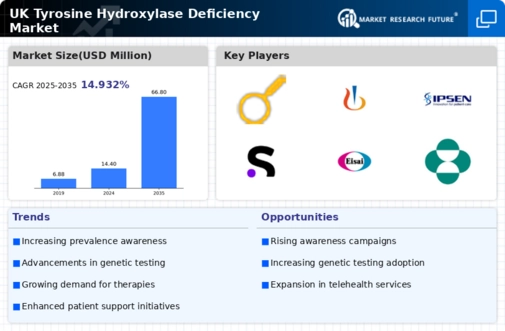Government Initiatives and Funding
Government initiatives aimed at improving healthcare access and funding for rare diseases play a pivotal role in the tyrosine hydroxylase-deficiency market. In the UK, the National Health Service (NHS) has been actively promoting research into rare genetic disorders, including tyrosine hydroxylase deficiency. Increased funding for research projects and clinical trials is likely to enhance the understanding of the disease and lead to the development of new therapies. Additionally, public health campaigns aimed at raising awareness about rare diseases can facilitate earlier diagnosis and treatment, which is essential for improving patient outcomes. The commitment of the UK government to support rare disease research may also attract private investments, thereby fostering a more robust market environment for the tyrosine hydroxylase-deficiency market. This collaborative approach between public and private sectors is expected to yield significant advancements in treatment options.
Growing Patient Advocacy and Support Groups
The emergence of patient advocacy and support groups is becoming a significant driver in the tyrosine hydroxylase-deficiency market. These organizations play a vital role in raising awareness about the condition, providing resources for affected individuals and families, and advocating for better healthcare policies. In the UK, various support groups are actively working to connect patients with healthcare providers and researchers, fostering a community that encourages information sharing and collaboration. This grassroots movement can lead to increased visibility of tyrosine hydroxylase deficiency, prompting healthcare professionals to consider it more frequently in differential diagnoses. Furthermore, advocacy efforts may influence funding allocations for research and treatment options, ultimately benefiting the tyrosine hydroxylase-deficiency market. The collective voice of patients and their families is likely to drive demand for improved therapies and support services.
Emerging Research and Development Activities
Emerging research and development activities are poised to shape the future of the tyrosine hydroxylase-deficiency market. With ongoing studies focusing on the underlying mechanisms of the disorder, there is a growing interest in developing novel therapeutic approaches. Research institutions and pharmaceutical companies in the UK are increasingly investing in the exploration of gene therapies and enzyme replacement therapies, which may offer promising solutions for patients. The potential for breakthroughs in treatment options could significantly alter the landscape of the tyrosine hydroxylase-deficiency market. Additionally, collaborations between academic institutions and industry stakeholders are likely to accelerate the pace of innovation, leading to the introduction of new products and services. As the body of knowledge surrounding tyrosine hydroxylase deficiency expands, the market may witness a surge in demand for effective and targeted therapies.
Technological Advancements in Diagnostic Tools
Technological advancements in diagnostic tools are significantly influencing the tyrosine hydroxylase-deficiency market. The development of more sophisticated genetic testing methods, such as next-generation sequencing, has improved the accuracy and speed of diagnosing tyrosine hydroxylase deficiency. These innovations enable healthcare professionals to identify the condition earlier, which is crucial for effective management and treatment. The increasing availability of these advanced diagnostic tools in the UK healthcare system is likely to enhance patient access to timely diagnosis. Moreover, as diagnostic technologies continue to evolve, they may lead to the discovery of additional biomarkers associated with the condition, further enriching the understanding of tyrosine hydroxylase deficiency. This progress is expected to drive demand for targeted therapies, thereby expanding the market for treatments and interventions.
Increasing Prevalence of Neurological Disorders
The rising incidence of neurological disorders in the UK is a crucial driver for the tyrosine hydroxylase-deficiency market. Recent studies indicate that the prevalence of such disorders is increasing, with estimates suggesting that approximately 1 in 1,000,000 individuals may be affected by tyrosine hydroxylase deficiency. This growing patient population necessitates enhanced diagnostic and therapeutic options, thereby stimulating market growth. As healthcare providers become more aware of the condition, the demand for specialized treatments is likely to rise. Furthermore, the increasing burden of neurological diseases on the healthcare system may prompt government and private sector investments in research and development, ultimately benefiting the tyrosine hydroxylase-deficiency market. The focus on improving patient outcomes and quality of life is expected to drive innovation in treatment modalities, further expanding the market landscape.
















